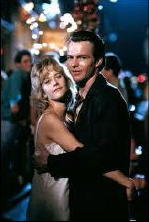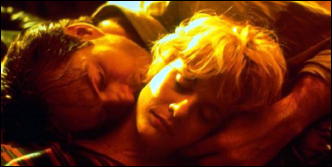Sun 22 Jun 2014
A Movie Review by Dan Stumpf: D.O.A. (1988).
Posted by Steve under Mystery movies , Reviews[8] Comments
D.O.A. Buena Vista Pictures, 1988. Dennis Quaid, Meg Ryan, Charlotte Rampling, Daniel Stern, Jane Kaczmarek, Christopher Neame, Brion James, Elizabeth Arlen. Directors: Annabel Jankel & Rocky Morton.
Recently saw this 1988 remake of D.O.A. with Dennis Quaid, Meg Ryan, Daniel Stern, Charlotte Rampling and a few other fine actors whose names escape me. This movie has been almost universally panned — Maltin calls it “noisy and needless” and even TV Guide found it “pointless” — but I thought it worked much better than the original, and thus once again shall wait for Fashion to catch up with me.
The plot, lifted from the 1948 film, has the protagonist indulge in a night of heavy drinking and discover the next day that he’s been poisoned; he has only another day or so to live and nothing can save him. That’s it. He gonna die and ain’t nothing for it. Faced with this, he spends his last day finding his killer — the Detective and Victim as One.
It’s a great idea, but the 1948 film s a surprisingly pedestrian affair, with little momentum and a flat performance by Edmund O’Brien as a schlemiel who just looks toodam healthy to be dying. All through the movie, I just couldn’t believe him.
On the other hand, the 1988 remake offers a fine turn by Dennis Quaid as a popular, sexy college lit professor who wrote some fine books a few years back, got a remarkable woman to marry him when he was younger, and might have been a good teacher once, but now he just tosses flip answers back to his admiring students, gives them A’s without reading their work, and his wife is leaving him because he just doesn’t act like he cares anymore.
Thematically, this is really neat-o; the man has been dead for years and doesn’t realize it till someone poisons him. Add to this a couple of nifty sub-plots, snappy dialogue, some gratuitous sex and violence (always a golden page in my book) and you’ve got the beginnings of a very textured work.
Directors Rocky Morton and Annabel Jankel throw in a lot of artsy camera angles left over from the 6Os, pace the action for speed, and take time to evoke surprisingly believable performances from even the bit players. My only kvetch is the number of obvious homages to film noir and the length of time it takes me to italicize a sentence like that: Quaid’s character is named Cornell, the film starts and ends in Black & White, and there are two cops whose line of hard-boiled patter rolls so smooth and well-timed they sound like bit-players in a sitcom.
This aside, it was a film I really liked.




June 22nd, 2014 at 1:57 pm
Hmmm. I’m going to have to watch this one again.
June 22nd, 2014 at 4:35 pm
O’Brien’s DOA does not have him sick and dying but poisoned. Taking place over 24 1950 hours no reason for him or his appearance to have deteriorated. It is a second feature with an exploitable center. Rather this thing is a nasty riff on the same theme. Well, sometimes, the majority opinion makes sense.
June 23rd, 2014 at 6:37 am
I watched the remake of DOA at the cinema when it was new and enjoyed it. I agree with Dan Stumpf.
June 23rd, 2014 at 9:51 am
When I first read Dan’s comment that the remake was “…much better than the original.”, I immediately started disagreeing because the 1950 D.O.A. is often mentioned in lists as among the best classic film noirs.
Edmond O’Brien is one of my favorite film noir stars because he is not the usual young, good looking, hero. Instead, he is someone we can identify with: overweight, average looking, even sort of homely.
So last night at dinner and at midnight, I watched the two versions. The 1950 film I’ve seen several times and I give 8 out of 10. The 1988 version with Dennis Quaid, I’ve seen once a long time ago.
The 1950 film held up well even after seeing it a half dozen times during the last 50 years. Nice downbeat ending and O’Brien is excellent as the dead man walking. However two things bothered me: the wolf whistles at the beginning when O’Brien checks into the hotel and sees pretty girls and the absurd scene when Neville Brand takes our hero for a ride. He says he is going to kill him, yet Brand drives the car and naturally O’Brien jumps out of it and escapes.
I then watched the 1988 neo-noir remake and I have to admit I liked it also but would give it a lower rating of 7 out of 10. Except for the main idea and the beginning, it is not really a remake of the 1950 film. It is a completely different movie with new characters, motives, murders, etc. If it had been a scene for scene remake I doubt if I would have been able to watch it all.
There was a third remake called “Color Me Dead” or something and I have not seen this film. I recommend both the 1950 and 1988 movies but they are not really the same film at all.
June 23rd, 2014 at 11:30 am
I was eleven when DOA was released. In my town the crosswalks were painted with these words: DOA – Ask any policeman what it means. In my gang no one ever had to ask. We went to the movies.
June 23rd, 2014 at 4:35 pm
Sorry Dan, but fashion and I will never catch up to this pointless remake. If you are going to remake a classic like D.O.A. you should do it better, or at least, like the remake of Out of the Past, throw in Rachel Ward and some un-needed nudity.
The original has a Woolrichian feel of doom and inescapable fate, the ending is extremely powerful as is the opening when O’Brien reports his own murder. It’s pure pulp and it is meant to be.
I bought O’Brien in the role, I never really felt Quaid was suffering much more than dyspepsia.
The original has a nightmarish quality, right down to some illogical bits (probably unintended I’ll grant)while the remake is just a rather ordinary suspense film with an attractive enough cast, but no real energy.
All the filler about Quaid’s life did not make me feel anything more about his character than O’Brien’s, and frankly it pushed the running time a little long for this. It needed a tight short intense film like the first and instead got a slick pretty and rather — sorry — pointless remake.
At that it’s better than the remake of Psycho, but that’s faint praise.
It’s a prettier film by far, but it is shallow and not really noir for all its efforts. And you might note either no one ever heard of the directors again or they used a pseudonym out of shame. This is pretty much an Alan Smithies type film.
June 23rd, 2014 at 4:48 pm
As I remember it, most of the critics came down on this movie fairly hard when it first came out. (I may remember it wrong.) But I spotted a “two thumbs up” from Siskel and Ebert on the poster, so I checked out Ebert’s comments online, which all in all, were (as advertised) quite positive.
http://www.rogerebert.com/reviews/doa-1988
Says he, his last two paragraphs:
““D.O.A.†is a witty and literate thriller, with a lot of irony to cut the violence. Quaid is convincing as the chain-smoking English professor, Meg Ryan is true blue as the stalwart coed and Rampling looks capable of keeping her victims alive just to toy with them.
“The film was directed by Rocky Morton and Annabel Jankel, who created “Max Headroom.†This is their first feature, showing an almost sensuous love for the shadows and secrets of film noir.”
I have a feeling that I will still like the first one more, but this semi-remake certainly sounds like a movie I really do have to watch again.
October 12th, 2022 at 10:38 pm
I have seen the movie, I like it very much!